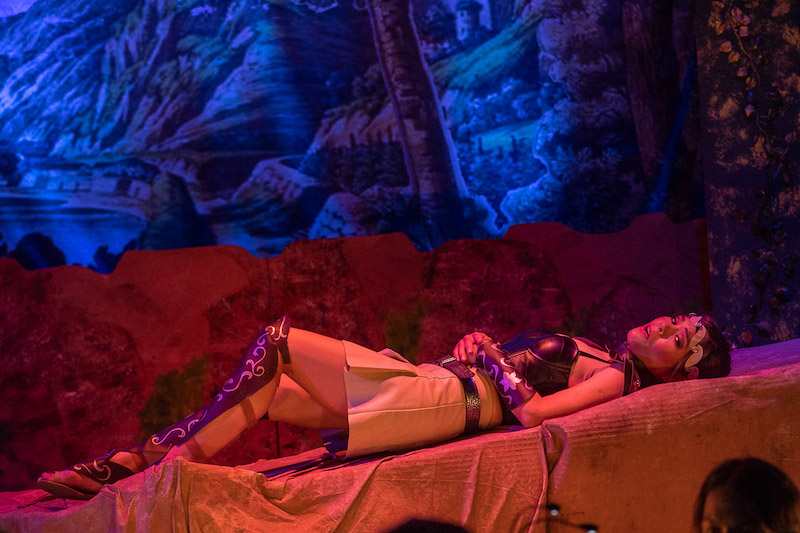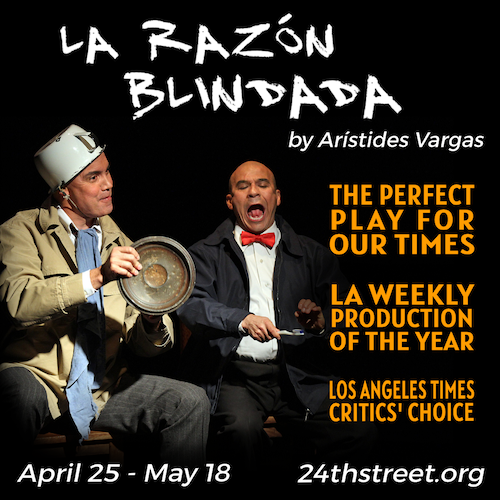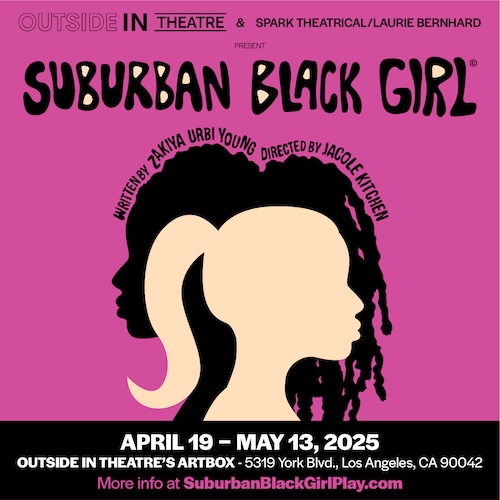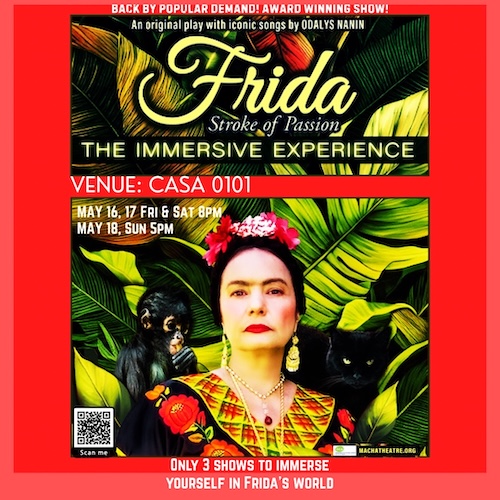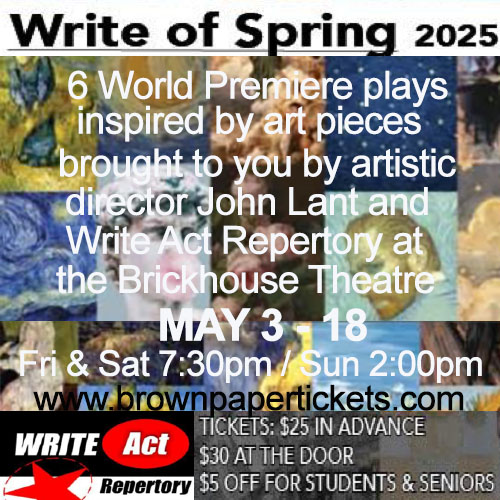Ercole Su’l Termodonte
Reviewed by V Cate
Pacific Opera Project
Thru January 21st
RECOMMENDED
Pacific Opera Project (POP) returns with a scintillating new show, a rarity that is simultaneously a centuries-old work yet a United States premiere. Ercole su’l Termodonte (Hercules in Termodon) is an Italian opera in three acts composed by the illustrious Antonio Vivaldi. Although the score had been lost, the music was discovered across several archives and reconstructed by Alessandro Ciccolini. At the time of its original mounting in the 1700s, a papal edict was in effect which prevented women from appearing onstage in Rome, so men (many of whom were castrati) performed all of the roles.
Whether because of Mercury Retrograde or LA’s strange persistent rain or perhaps someone having angered the gods, this particular reviewed performance had a lot working against it. Two members of the cast were out with Covid. The projected translations of the Italian lyrics sometimes skipped or ceased for periods. And there were troubles with the set — at a certain point, a heavy set piece fell dramatically close to an orchestra member’s head (who was okay, even buoyant, and after a five-minute hold to re-set, the show continued).
Even if we have the engrained response, “That’s showbiz, baby!,” maybe it’s also time to wonder at what point should a show be postponed? Not having translations for an Italian opera is one thing. Fluke occurrences on stage of all sorts do happen (though we are lucky we did not witness a much more dramatic conclusion of a different kind). But the decision to perform a show without two major characters (no understudies here — a tricky choice during a pandemic) necessitated a gutting of the show: snippets sung from offstage, one-sided love scenes, pieces of song and plot entirely ripped out. While the general plot of the show was made available through digital program, no note or mention of the specifics of these adjustments was ever made to the audience. So what viewers experienced was not necessarily Vivaldi’s opera, nor even POP’s vision of it – it was a brazen embrace of the classic mantra, “The show must go on!”
For the reasons above, it is impossible to truly review the show – either as written or as rehearsed. But here is what can be said.
First, it is no small matter that American audiences are able to hear, live, “new” music by Vivaldi for the first time, ever. (If you don’t know any of the numerous compositions of the prolific Vivaldi off the top of your head, you’ll likely have at least some familiarity with The Four Seasons (1723), which was composed the same year Ercole Su’l Termodonte premiered. Vivaldi’s music is piercingly bright, luscious as a garden, and gives us space to meditate throughout any given work, which is stunning, complex, and easy to embrace. Antonio Salvi, who wrote the libretto, created utter poetry out of straight-forward feelings the characters experience within a mytho-archetypal space. The result is a total Baroque lavishness of sound.
As for this production itself, Music Director/Conductor Kyle Naig and the uncredited orchestra members do marvelous work bringing the gift of Vivaldi’s music to life. Truly impressive work.
Whether because of the compounding effects of this production’s ill-fated elements, or for some other reason, the overall execution of the piece was lacking, and so many facets of the show were only fine.
The transformation of the Highland Park Ebell Club into a Baroque opera house (David Handler is credited with set construction) is more of a sweet thought than a well-executed experiment in “immersive” opera, as the concept is billed. Rough wood, painted sterile white, approximate box seating without the perspective height or opulence that should accompany. To the credit of the cohesion that existed, the orchestra members, concessions workers, and Director of Community Engagement were bedecked in 1700s attire and wigs, and the programs were wrapped up as scrolls.
The piece itself tells the story of the Ninth Labor of Hercules. Essentially, Hercules, demigod son of Zeus, has spent the last several years atoning for his magical madness-induced murder of his wife and children. He is given a total of 12 Labors, impossible tasks. This particular Labor involves retrieving the sword of the Queen of the Amazons — a tribe of warrior women who devote themselves to battle, cultivating the feminine, and generally being totally fearsome and badass.
At the show’s open, a small hunting party of Amazons revels in the beauty of the forest. The script essentially draws masculine and feminine as opposing forces. Here, we establish that the feminine, regardless of all else, is inherently connected to the divinity of nature. When we meet Ercole (Hercules, played by Logan Webber) and his band of warriors, we learn his and their focus — their masculinity — is rooted in glory and conquest.
These themes are outdated, and sometimes problematic for a modern audience (there is some implication of normalized rape and instances of coercion). We are seeing a myth through the lens of 1700s Italy, but which is not directed with the understanding of a modern audience. Meanwhile, the story’s inherent eroticism goes untouched.
In terms of the performances — sound aside — strong direction seemed to have been missing. Opera obviously necessitates technical realities of the face and body to ensure the proper sound and stamina. But many of the ensemble seemed shy within the musical pauses, falling out of their characters’ focus. (Janet Todd as Ippolita was the greatest exception to this, firmly seated in her power throughout.) The strategic lyrical pauses written into the words were populated with choreographed mugging and incessant stroking of weaponry, to the point of absurdity. Vocally, the ensemble was fair; overall the performances were beautiful, but some performers consistently missed the technical mark. Countertenor Michael Skarke stood out with a miraculous voice.
There were some nice notions from director Josh Shaw in the form of clever set pieces. But these were hardly utilized to great success, and created awkward transitions that could have either been hidden by the gorgeous red curtain or else bypassed entirely, despite any feeling of need to fill up the space in Vivaldi’s breaks.
The lighting (designer uncredited) also did the production a disservice, providing bright, bland lighting that did not seem to support the curated atmosphere, tell a story, or serve to hide the inevitable limitations of a set made on a budget.
In the end, both hard-headed Ercole and determined Antiope (Meagan Martin) relinquish their need for absolute victory in the face of love. Antiope still relinquishes her weapons, and the Labor is able to be completed without bloodshed. But a double-marriage enacted without the players provided a hollow climax. Still, the music is enough to see the show regardless, and the efforts of the cast and crew were indeed Herculean.
Pacific Opera Project (POP) at The Highland Park Ebell Club, 131 S. Avenue 57, Los Angeles 90042; Fri., 8 pm / Sat., 2 & 7 pm; pacificoperaproject.com; Running time: 2 hours 15 minutes with one intermission.


